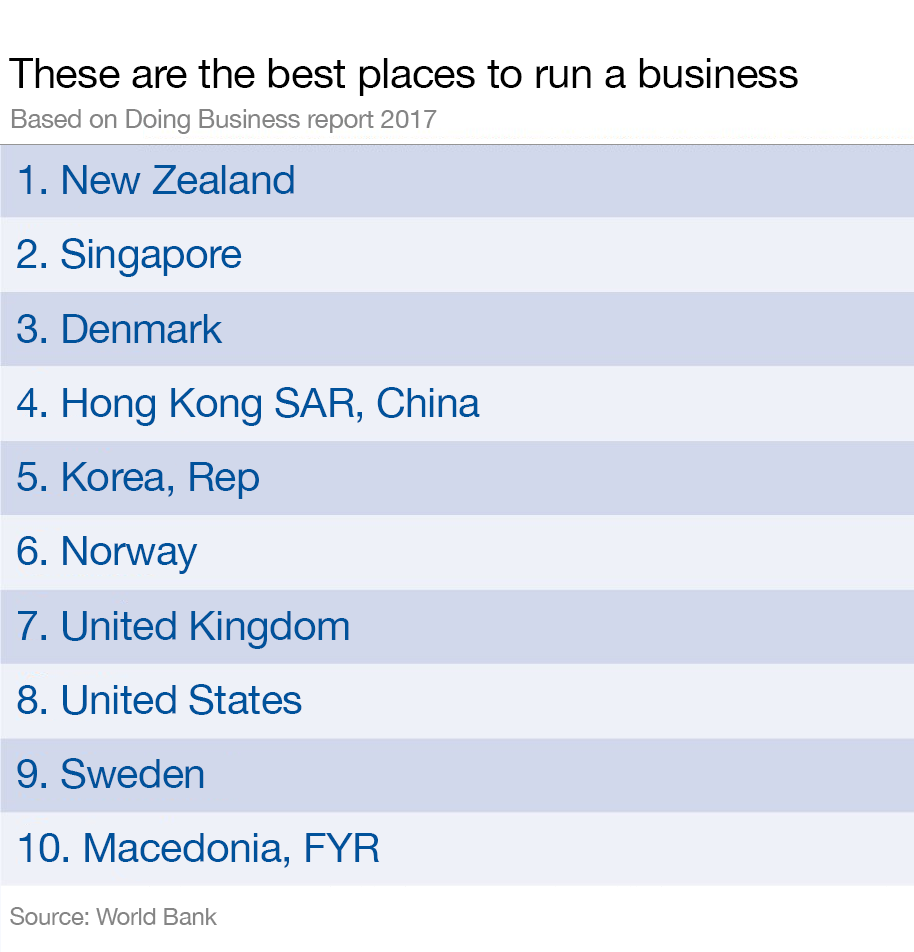This is the best place in the world to run a business

New Zealand snatches the top spot as most enterprise-friendly nation
Image: REUTERS/Henning Gloystein
Stay up to date:
Economic Progress
When it comes to running a business, New Zealand is the place to be, according to the World Bank, which ranks it as the easiest place in the world to start a company, register property and get credit.
New Zealand knocked Singapore off the top spot in the 2017 Doing Business report. Denmark, Hong Kong and South Korea also made the top five.
The annual report ranks economies on their ease of doing business, looking at several indicators including starting up, registering property, getting electricity, paying taxes and getting credit.

Europe’s surprising hot spot
Perhaps surprisingly, Europe’s top place for business is Macedonia, FYR. Taking the 10th spot in the overall ranking, it is the highest-ranking upper-middle-income country, the fourth easiest country to start a business, and in the top 10 for paying taxes.
The nation has seen dramatic improvements, moving up 86 places in just over a decade, likely thanks to offering one of Europe’s most favourable tax environments, as well as boasting a highly qualified workforce and low labour costs.
Scandinavia is also a prime spot for business, with Denmark, Norway and Sweden all making the top 10.
Gender discrimination
For the first time, the World Bank report looks into the impact of gender on doing business, finding that in many places across the world, female entrepreneurs are discriminated against.
It‘s well known that in many areas of the world women face more obstacles than men when it comes to economic and business activities, and the organization notes that therefore it is important to report on these gender differences.
In 23 countries, married women face more steps than men when starting a business; 17 countries place a higher value on a man’s testimony than a woman’s in the civil courts; 16 countries limit a woman’s ability to own, use and transfer property; and in 17 economies women require a man’s permission to leave the house.
The Middle East and North Africa are the worst performers, with the report finding discriminating policies in 70% of the region’s economies.
Providing women with the same opportunities as men isn’t just good for equality. The report notes that the inclusion of women in the workforce is known to have a positive impact on economic growth and development.
Accept our marketing cookies to access this content.
These cookies are currently disabled in your browser.
Don't miss any update on this topic
Create a free account and access your personalized content collection with our latest publications and analyses.
License and Republishing
World Economic Forum articles may be republished in accordance with the Creative Commons Attribution-NonCommercial-NoDerivatives 4.0 International Public License, and in accordance with our Terms of Use.
The views expressed in this article are those of the author alone and not the World Economic Forum.
Related topics:
Forum Stories newsletter
Bringing you weekly curated insights and analysis on the global issues that matter.
More on Economic GrowthSee all
Khalid Alaamer
April 22, 2025
Jai Shroff
April 22, 2025
Samir Saran and Anirban Sarma
April 17, 2025
Lucia Fry and Naomi Nyamweya
April 17, 2025
Nada AlSaeed
April 16, 2025




